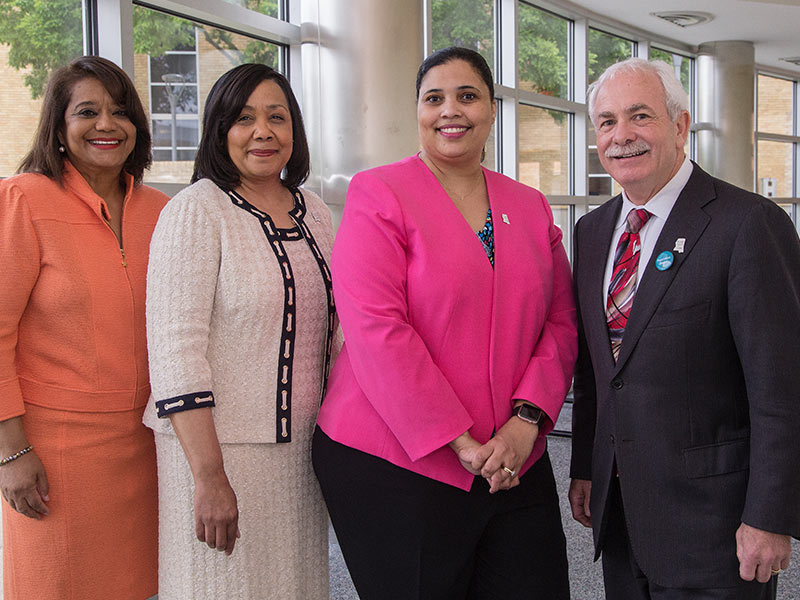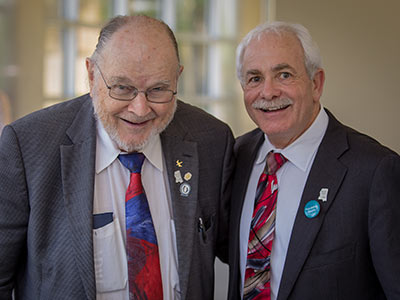New treatment collaborative pinpoints pre-diabetics early

With 15 percent-plus of the adult population coping with type 2 diabetes, Mississippi is a perennial national leader for a chronic health problem that kills.
But what if a new initiative to better screen adult residents who are unwittingly pre-diabetic, or who are at risk, could over time make the statistics much less staggering?
The John D. Bower School of Population Health at the University of Mississippi Medical Center is taking up that challenge. An ambitious, collaborative health practice project aims to substantially reduce type 2 diabetes, which too often is a primary or secondary reason for death in the state.
It’s called #DefeatDiabetesMS, an apt name because “diabetes is rampant in Mississippi,” said Victoria Gholar, the school’s director of strategic initiatives and resource management. “We will be collaborating with the Jackson Hinds Comprehensive Health Center to look at a technique to do greater screening.
“Sometimes, people don’t know that they are at risk for diabetes, or that they are pre-diabetic. We want to collaborate on a population health project to make sure that we are doing more screening than we’re doing now.”
Type 2 diabetes is a chronic condition that affects the way the body processes glucose, or blood sugar. The hormone insulin, produced by the pancreas, lets a person’s cells turn glucose from food into energy. But, the cells of people with type 2 diabetes don’t use insulin properly. The pancreas makes more insulin to try to get glucose into the cells, but it can’t keep up, and sugar builds up in the blood.
For those who don’t keep the disease under control, the toll can be devastating. Excess blood sugar can trigger complications that include severe damage to the eyes, kidneys, nerves and other body parts, and it can double the risk of heart attack and stroke. Cuts and blisters can become serious infections that don’t heal properly, potentially leading to full or partial limb amputations.
The heart of the collaborative will focus on more thoroughly screening patients seen at the Comprehensive Health Center in Jackson. They’ll be asked a set of questions to gauge if they are pre-diabetic. If they are, they’ll be offered medical help and education on lifestyle changes.
“It’s important to us to have this partnership because we have a large number of diabetic patients,” said Dr. Jasmin Chapman, chief executive officer of the Comprehensive Health Center. “We’re finding that the disparities are not improving as much as we’d like.
“This is a way that we can make a difference in the community,” Chapman said.
Questions in the screening will mirror some of those included in the American Diabetes Association’s type 2 diabetes risk survey. They include:
- What is your sex and your weight/age range?
- Have you been previously diagnosed with gestational diabetes?
- Do you have a mother, father, sister or brother with diabetes?
- Have you ever been diagnosed with high blood pressure?
- Are you physically active?
By acting on the information, “we can slow down the process” of the disease or prevent it entirely, Gholar said. “We will see what we can do to make referrals if needed, and to introduce healthy lifestyle programs to get people to practice more prevention techniques.”
That can mean lifestyle changes to increase physical activity and to lose weight and keep it off. Regular exercise, making wise food choices and limiting the amount of fat, salt and sweets doesn’t just help body weight control; it also helps control of blood pressure and cholesterol.
Data gathered will be used to show over time whether pre-diabetes rates in the state are increasing or decreasing.
“We are using this (screening) avenue because we want to make sure that we don’t have duplicate data,” Gholar said. “If we just sent surveys to people asking the questions, people might get them twice.”
The collaboration by design speaks to population health, which aims to prevent and cure disease by keeping people healthy through a systematic and interdisciplinary approach to health care. Factors having the biggest impact include health behaviors and socioeconomic status. Once you can predict who is at risk for developing diabetes, you can target prevention and treatment programs specifically designed to improve their health outcomes.
Traditional healthcare systems usually focus on interventions that can be prescribed or recommended to patients, such as medications or exercise regimens. However, health care systems might not account for – let alone control – reasons why a patient isn’t taking his medicine or getting regular exercise. His neighborhood might be unsafe for walking; he might not have transportation to a pharmacy, or can’t afford a co-pay.
“If a healthcare system is held responsible for something it’s not typically held responsible for, they may need to leverage” other resources or form partnerships with other organizations, such as government agencies and not-for-profits, said Fred Goldstein, a nationally recognized population health expert. Goldstein is founder and president of Accountable Health LLC, a health care consulting firm focused on population health, and he has a faculty appointment in the School of Population Health.
On Friday, he delivered the school’s Distinguished Population Health Lectureship, “SpaceX, Moon Shots and Diabetes in Mississippi.” His talk’s title alludes to the parallels between two challenging initiatives – space exploration and controlling type 2 diabetes in the state.

The diabetes collaboration will enlist the help of students in the school. “We’ll be able to have our students look at the data and the outcomes,” Gholar said. “We will do as much as we can to publicize this new screening initiative at the community health clinic.”
“My baby brother died of complications of diabetes,” Chapman said. “I know how devastating this disease can be. To have a partner like UMMC, with its expertise, can show us a better path.”
The results should be worth waiting for. “This will take several years – at least five, if not 10,” Gholar said. “It’s a very long-term project.
“Our rates aren’t getting any better. We must jump on this now, while we can.”


